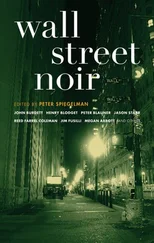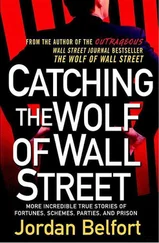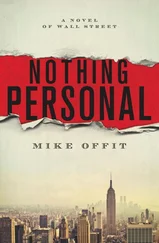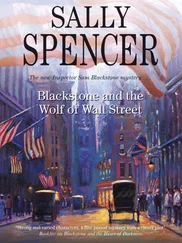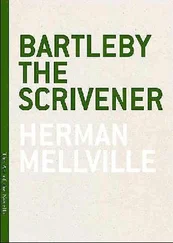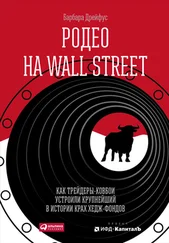“His name is Mark Hanna, and you’ll meet him soon enough.” With that, he handed me a stack of three-by-five index cards, each of them having the name and phone number of a wealthy business owner on it. “Smile and dial,” he instructed, “and don’t pick up your fucking head ’til twelve.” Then he sat down at his own desk, picked up a copy of The Wall Street Journal, and put his black crocodile dress shoes on the desktop and started reading.
I was about to pick up the phone when I felt a beefy hand on my shoulder. I looked up, and with a single glance I knew it was Mark Hanna. He reeked of success, like a true Master of the Universe. He was a big guy—about six-one, two-twenty, and most of it muscle. He had jet-black hair, dark intense eyes, thick fleshy features, and a fair smattering of acne scars. He was handsome, in a downtown sort of way, giving off the hip whiff of Greenwich Village. I felt the charisma oozing off him.
“Jordan?” he said, in a remarkably soothing tone.
“Yeah, that’s me,” I replied, in the tone of the doomed. “Pond scum first-class, at your service!”
He laughed warmly, and the shoulder pads of his $2,000 gray pin-striped suit rose and fell with each chuckle. Then, in a voice louder than necessary, he said, “Yeah, well, I see you got your first dose of the village asshole!” He motioned his head toward Scott.
I nodded imperceptibly. He winked back. “No worry: I’m the senior broker here; he’s just a worthless piker. So disregard everything he said and anything he might ever say in the future.”
Try as I might, I couldn’t help but glance over at Scott, who was now muttering the words: “Fuck you, Hanna!”
Mark didn’t take offense, though. He simply shrugged and stepped around my desk, putting his great bulk between Scott and me, and he said, “Don’t let him bother you. I hear you’re a first-class salesman. In a year from now that moron will be kissing your ass.”
I smiled, feeling a mixture of pride and embarrassment. “Who told you I was a great salesman?”
“Steven Schwartz, the guy who hired you. He said you pitched him stock right in the job interview.” Mark chuckled at that. “He was impressed; he told me to watch out for you.”
“Yeah, I was nervous he wasn’t gonna hire me. There were twenty people lined up for interviews, so I figured I better do something drastic—you know, make an impression.” I shrugged my shoulders. “He told me I’d need to tone it down a bit, though.”
Mark smirked. “Yeah, well don’t tone it down too much. High pressure’s a must in this business. People don’t buy stock; it gets sold to them. Don’t ever forget that.” He paused, letting his words sink in. “Anyway, Sir Scumbag over there was right about one thing: Connecting does suck. I did it for seven months, and I wanted to kill myself every day. So I’ll let you in on a little secret”—and he lowered his voice conspiratorially—“You only pretend to connect. You loaf off at every opportunity.” He smiled and winked, then raised his voice back to normal. “Don’t get me wrong; I want you to pass me as many connects as possible, because I make money off them. But I don’t want you to slit your wrists over it, ’cause I hate the sight of blood.” He winked again. “So take lots of breaks. Go to the bathroom and jerk off if you have to. That’s what I did, and it worked like a charm for me. You like jerking off, I assume, right?”
I was a bit taken aback by the question, but as I would later learn, a Wall Street boardroom was no place for symbolic pleasantries. Words like shit and fuck and bastard and prick were as common as yes and no and maybe and please. I said, “Yeah, I, uh, love jerking off. I mean, what guy doesn’t, right?”
He nodded, almost relieved. “Good, that’s real good. Jerking off is key. And I also strongly recommend the use of drugs, especially cocaine, because that’ll make you dial faster, which is good for me.” He paused, as if searching for more words of wisdom, but apparently came up short. “Well, that’s about it,” he said. “That’s all the knowledge I can impart to you now. You’ll do fine, rookie. One day you’ll even look back at this and laugh; that much I can promise you.” He smiled once more and then took a seat before his own phone.
A moment later a buzzer sounded, announcing that the market had just opened. I looked at my Timex watch, purchased at JCPenney for fourteen bucks last week. It was nine-thirty on the nose. It was May 4, 1987, my first day on Wall Street.
Just then, over the loudspeaker, came the voice of LF Rothschild’s sales manager, Steven Schwartz. “Okay, gentlemen. The futures look strong this morning, and serious buying is coming in from Tokyo.” Steven was only thirty-eight years old, but he’d made over $2 million last year. (Another Master of the Universe.) “We’re looking at a ten-point pop at the open,” he added, “so let’s hit the phones and rock and roll!”
And just like that the room broke out into pandemonium. Feet came flying off desktops; Wall Street Journal s were filed away in garbage cans; shirtsleeves were rolled up to the elbows; and one by one brokers picked up their phones and started dialing. I picked up my own phone and started dialing too.
Within minutes, everyone was pacing about furiously and gesticulating wildly and shouting into their black telephones, which created a mighty roar. It was the first time I’d heard the roar of a Wall Street boardroom, which sounded like the roar of a mob. It was a sound I’d never forget, a sound that would change my life forever. It was the sound of young men engulfed by greed and ambition, pitching their hearts and souls out to wealthy business owners across America.
“Miniscribe’s a fucking steal down here,” screamed a chubby-faced yuppie into his telephone. He was twenty-eight, and he had a raging coke habit and a gross income of $600,000. “Your broker in West Virginia? Christ! He might be good at picking coal-mining stocks, but it’s the eighties now. The name of the game is high-tech!”
“I got fifty thousand July Fifties!” screamed a broker, two desks over.
“They’re out of the money!” yelled another.
“I’m not getting rich on one trade,” swore a broker to his client.
“Are you kidding?” snapped Scott into his headset. “After I split my commission with the firm and the government I can’t put Puppy Chow in my dog’s bowl!”
Every so often a broker would slam his phone down in victory and then fill out a buy ticket and walk over to a pneumatic tubing system that had been affixed to a support column. He would stick the ticket in a glass cylinder and watch it get sucked up into the ceiling. From there, the ticket made its way to the trading desk on the other side of the building, where it would be rerouted to the floor of the New York Stock Exchange for execution. So the ceiling had been lowered to make room for the tubing, and it seemed to bear down on my head.
By ten o’clock, Mark Hanna had made three trips to the support column, and he was about to make another. He was so smooth on the phone that it literally boggled my mind. It was as if he were apologizing to his clients as he ripped their eyeballs out. “Sir, let me say this,” Mark was saying to the chairman of a Fortune 500 company. “I pride myself on finding the bottom of these issues. And my goal is not only to guide you into these situations but to guide you out as well.” His tone was so soft and mellow that it was almost hypnotic. “I’d like to be an asset to you for the long term; to be an asset to your business—and to your family.”
Two minutes later Mark was at the tubing system with a quarter-million-dollar buy order for a stock called Microsoft. I’d never heard of Microsoft before, but it sounded like a pretty decent company. Anyway, Mark’s commission on the trade was $3,000. I had seven dollars in my pocket.
Читать дальше

